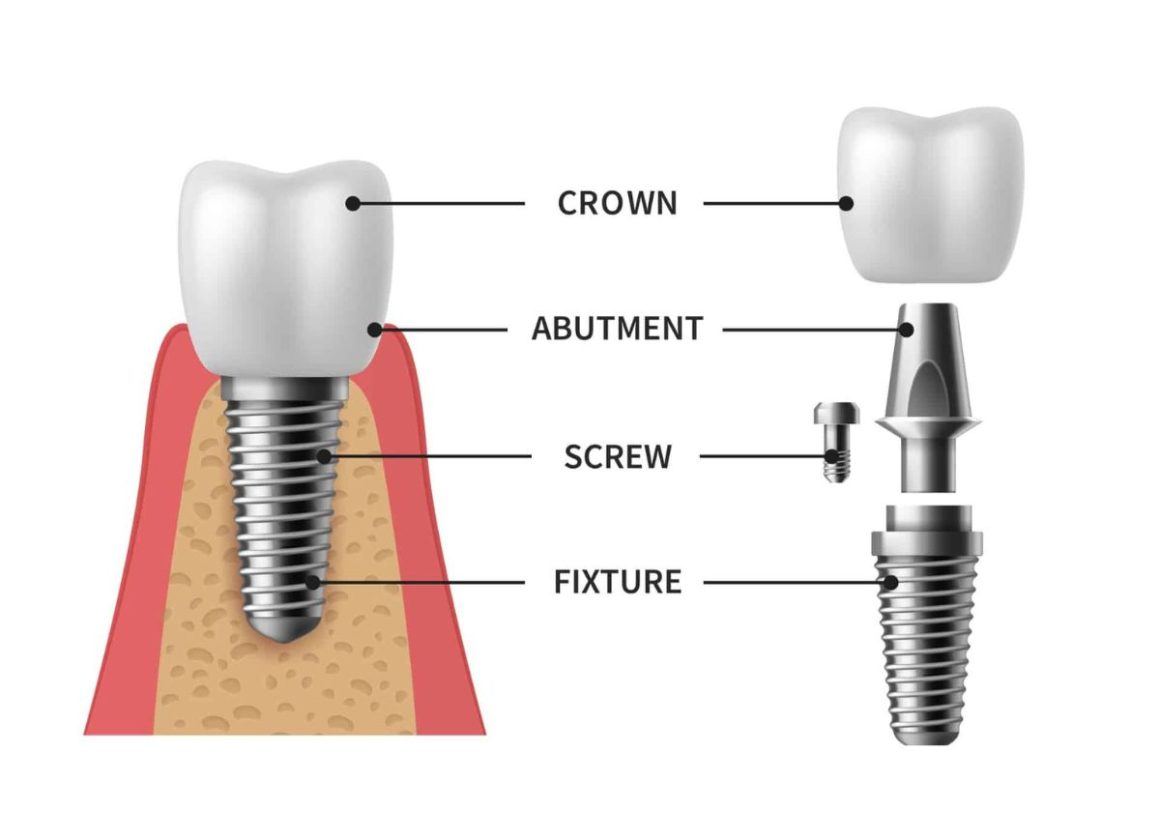Losing a tooth can feel like a big deal dental implants is a great solution for a great smile, your confidence, and even how you eat. But here’s the good news: dental implants are here to change the game. They’re not just a replacement for missing teeth; they’re a long-term solution that looks, feels, and works like the real thing. If you’ve been curious about dental implants, you’re in the right place. This guide will walk you through everything you need to know, from what they are to how they work, and what to expect along the way.
What Are Dental Implants?
Think of dental implants as tiny, super-strong anchors for your teeth. They’re small titanium posts that are surgically placed into your jawbone, acting as artificial roots for replacement teeth. Once they’re in, they provide a solid foundation for crowns, bridges, or even dentures. Unlike traditional dentures, which can slip or feel awkward, implants are fixed in place—so you can eat, talk, and smile with confidence.
Types of Dental Implants
Not all dental implants are the same. Depending on your needs, your dentist might recommend one of these options:
- Endosteal Implants: These are the most common type, placed directly into your jawbone. They’re great if you have enough healthy bone to support them.
- Subperiosteal Implants: These sit on top of the jawbone but under the gums. They’re a good option if your bone isn’t thick or strong enough for endosteal implants.
- All-on-4 Implants: Perfect if you’re missing most or all of your teeth. This technique uses just four implants to support a full arch of teeth.
Why Choose Dental Implants?
Dental implants aren’t just about filling gaps in your smile—they come with a host of benefits:
- They Look and Feel Natural: No one will know they’re not your real teeth.
- They Protect Your Jawbone: When you lose a tooth, your jawbone can start to shrink. Implants prevent this by acting like natural tooth roots.
- They’re Built to Last: With proper care, implants can last a lifetime.
- They Make Life Easier: Forget about messy adhesives or worrying about dentures slipping. Implants stay put, so you can eat your favorite foods without a second thought.
What’s the Process Like?
Getting dental implants is a journey, but it’s one that’s worth it. Here’s what you can expect:
- Consultation: Your dentist will check your teeth, take X-rays, and create a personalized plan for you.
- Implant Placement: The titanium post is placed into your jawbone during a minor surgical procedure. Don’t worry—you’ll be numbed or sedated, so it’s not as scary as it sounds.
- Healing Time: Over the next few months, the implant will fuse with your jawbone in a process called osseointegration. This is what makes implants so strong and stable.
- Abutment and Crown: Once the implant is secure, a small connector (called an abutment) is attached, and a custom-made crown is placed on top. Voilà—your new tooth is ready!
Are Dental Implants Right for You?
Dental implants are a fantastic option for many people, but they’re not a one-size-fits-all solution. You might be a good candidate if:
- You’re in good overall health.
- You have enough jawbone to support the implant (or you’re willing to have a bone graft).
- You don’t smoke (or you’re ready to quit during the healing process).
If you’re not sure, don’t worry—your dentist will help you figure it out.
Taking Care of Your Implants
Once you have your new implant, it’s important to take care of it just like you would your natural teeth. Here are a few tips:
- Brush and floss daily to keep your gums healthy.
- Visit your dentist regularly for check-ups and cleanings.
- Avoid chewing on hard things like ice or pens (yes, we’ve all done it!).
Common Questions About Dental Implants
- Do dental implants hurt?
Most people say the procedure is less painful than they expected. You’ll be numbed or sedated, and any discomfort afterward can usually be managed with over-the-counter pain relievers. - How much do they cost?
The cost varies depending on how many implants you need and whether you require additional procedures like bone grafting. On average, a single implant can cost between 25,000 and 45,000. While it’s an investment, many people find it’s worth it for the long-term benefits. - How long do they last?
With proper care, the implant itself can last a lifetime. The crown on top might need to be replaced every 10-15 years, but that’s a small price to pay for a smile that feels like your own.
Final Thoughts
Dental implants are more than just a way to replace missing teeth—they’re a way to restore your confidence, your smile, and your quality of life. If you’ve been thinking about implants, why not take the next step? Schedule a consultation with your dentist to see if they’re the right choice for you. Your future self will thank you!



Leave a Reply